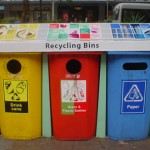After gathering extensive public input, the Florida Department of Environmental Protection (DEP) recently released its report with recommendations to achieve a new statewide recycling goal of 75% by the year 2020. The Energy, Climate Change and Economic Security Act of 2008 established this new goal and directed DEP to submit a comprehensive program by January 1, 2010.
 “The 75% recycling goal is the highest of any state,” said DEP Secretary Michael W. Sole. “It will be a challenge to achieve, but it can be reached through partnerships among state government, local governments, trade organizations, schools, businesses and industries as well as the people of Florida.”
“The 75% recycling goal is the highest of any state,” said DEP Secretary Michael W. Sole. “It will be a challenge to achieve, but it can be reached through partnerships among state government, local governments, trade organizations, schools, businesses and industries as well as the people of Florida.”
The information and recommendations in the report were developed based on broad research and contributions of more than 500 stakeholders who participated in four public workshops. An even wider range of ideas were submitted through E-mails and DEP’s Web forum, which received nearly 12,000 visits.
Florida generates more than 32 million tons of municipal solid waste annually, almost two tons per resident per year. Today, more than two decades after the Legislature passed Florida’s first 30% recycling goal, Floridians collectively recycle only 28% of their solid waste. The report explores ways to increase the percent of material recycled in an economically responsible way through heightened public awareness, state leadership, development and expansion of recycling markets as well as increased investments throughout the local government and commercial sectors.
The report outlines initial steps, low in financial impact, but high in recycling value in order to make the report practical in today’s economic climate. Some of the key recommendations in the report include:
* Require state agencies to meet the 75% goal.
* Apply the new recycling goal to counties with a population greater than 100,000 and cities with a population greater than 50,000.
* Require commercial recycling in large counties and cities to include multi-family residential units such as apartments and condominiums, as well as institutional facilities such as schools and hospitals.
* Direct school districts to implement recycling programs.
* Create a Recycling Grants or Revolving Loan program to help local governments reach a 75% recycling goal in their jurisdictions.
* Require that all unlined construction and demolition debris (C&D) disposal facilities be modified to incorporate a Materials Recovery Facility (MRF). A MRF is a specialized plant that receives, separates and prepares recyclable materials for marketing to end-user manufacturers. By incorporating a MRF or some similar sorting and separating operation at C&D facilities, recyclable materials such as wood waste, asphalt, concrete, etc., would not end up in traditional landfills.
* Create a recycling business assistance center to promote markets for the entire spectrum of recyclable municipal solid waste materials, organic and inorganic.
The next step in the process is for the Legislature to consider these recommendations during the 2010 legislative session.
To view the report, please visit www.dep.state.fl.us/waste/recyclinggoal75. For more information on recycling, visit www.dep.state.fl.us/waste/categories/recycling.


